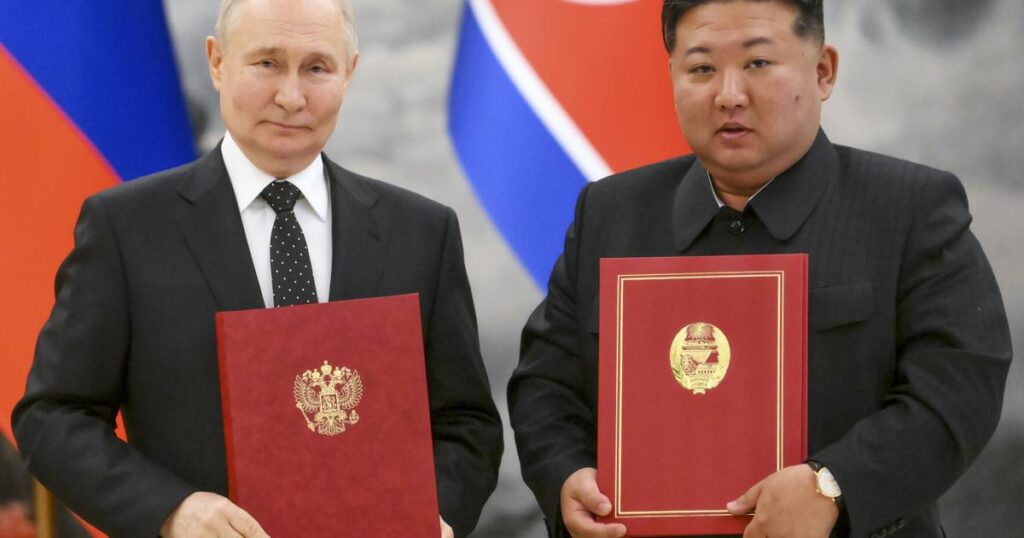SEOUL, South Korea – A recent summit in Pyongyang between Russian President Vladimir Putin and North Korean leader Kim Jong Un has resulted in a strategic partnership agreement, which both leaders are touting as a breakthrough. However, the true implications of this landmark pact for their bilateral relationship remain uncertain.
This agreement could potentially signify the most significant accord between the two nations since the Cold War era. Opinions vary on the extent of Russia’s security commitments to North Korea under this new arrangement. North Korean leader Kim Jong Un has described the deal as elevating the bilateral relationship to the level of an alliance, a sentiment that Russian President Putin has diplomatically sidestepped, refraining from labeling the arrangement explicitly as an alliance.
The day following the agreement’s signing, North Korean state media published the text of the treaty, which outlines commitments to mutual defense assistance and broader cooperation in military affairs, foreign policy, and trade. Interestingly, the Russian side has yet to release its version of the text.
South Korean officials, amidst this evolving geopolitical landscape, are still working through the implications of the agreement. They are particularly focused on understanding how Russia might respond if North Korea were to come under attack. The rapprochement between Russia and North Korea, both nuclear-armed states, has been facilitated by their shared adversarial stance towards the West, particularly amid Russia’s invasion of Ukraine and its stringent suppression of domestic dissent.
This new agreement could signify a further deepening of ties, posing significant challenges to the international community. According to statements from state media and expert analysis, several important points emerge from this new partnership.
Article 4 and Security Commitments
Central to the debate over the partnership is Article 4 of the agreement, which, as per North Korean reports, stipulates that if either nation is invaded and consequently finds itself in a state of war, the other must provide “all means at its disposal without delay,” including military support, in accordance with the laws of both countries and Article 51 of the United Nations Charter, which provides for self-defense.
Analysts have differing views on the robustness of this commitment. Some, like Cheong Seong Chang of the Sejong Institute, believe this harks back to the 1961 treaty between North Korea and the Soviet Union, which it closely mirrors. This treaty was set aside post-USSR dissolution and replaced in 2000 with a version offering weaker security assurances. Cheong argues that North Korea and Russia have effectively reinstated their Cold War-era military alliance.
Conversely, others, like Ankit Panda from the Carnegie Endowment for International Peace, caution that Article 4’s language is deliberately ambiguous to avoid implying an automatic military intervention. The invocation of the U.N. Charter adds another layer of complexity, further muddying the waters on Moscow’s actual commitments.
Military Cooperation and Technology Transfer
President Putin has linked the potential for military cooperation with North Korea to the Western provision of advanced weaponry to Ukraine. Putin remarked that the Russian Federation might develop military-technical cooperation with North Korea in line with the newly signed document. This assertion lends formal recognition to Western claims that covert military exchanges have already been occurring.
Western nations allege that Russia has been receiving ballistic missiles and ammunition from North Korea, amidst Russia’s resource drain from the Ukraine conflict. In return, Russia may have been transferring technology to North Korea, potentially boosting Kim’s nuclear arsenal and missile program. North Korean state outlets have emphasized that the agreement intends to bolster joint defense capabilities, although specifics remain vague about potentially including joint military training exercises.
The agreement also touches on efforts to establish a “just and multipolar new world order,” underscoring the geopolitical synergy between Russia and North Korea against the backdrop of their escalating tensions with the United States and its allies.
Economic Dimensions of the Partnership
Beyond military and political alignment, the agreement encompasses economic collaboration, crucial for sanction-hit North Korea. North Korea requires various goods and materials and has sought to send laborers abroad to generate hard currency. Putin highlighted that Russo-North Korean trade has surged ninefold over the past year, although he acknowledged that the overall volume remains modest.
In anticipation of the summit, South Korean analysts speculated that North Korea might seek to enhance labor exports to Russia and engage in other currency-generating activities bypassing U.N. sanctions. The agreement’s published text calls for intensified cooperation across multiple domains, including trade, science, technology, and tourism.
The true scope and impact of this agreement will only become clear with time, as both nations maneuver within the complex web of international relations.
Heintz reported from Tallinn, Estonia. Source.
